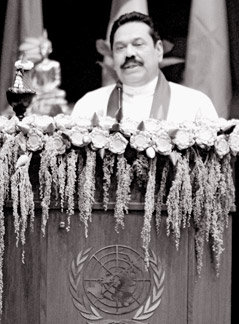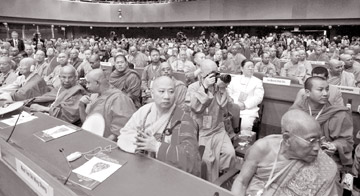|
President tells UN Vesak Day parley:
Buddha’s words can douse the flames of rancour and discord
|

President Mahinda Rajapaksa addresses the Sambuddhathva Jayanthi
and UN Vesak Day celebrations in Bangkok.
|
The vice of anger and hatred that leads to many a conflict and
heartache across the globe can be subdued through the power of loving
kindness, stated President Mahinda Rajapaksa in his keynote address at
the Sambuddhathva Jayanthi and UN Vesak Day celebrations held in Bangkok
yesterday.
“Let us spread that message of peace to all corners of the globe, let
the light of Buddhism shine and quell the darkness of ignorance,”
President Rajapaksa said.
Bhikkhu and lay delegations from 58 countries attended the conference
which marked the Vesak Day observance by the United Nations.
The President said: “It is a great joy to be amongst you today as we
celebrate the United Nations Day of Vesak, here in Bangkok. At the very
outset, allow me to thank the Royal Thai Government, United Nations and
the International Council for Day of Vesak, for the organisation of this
event, and also for the recognition given to this most important day in
the Buddhist calendar.
As the year of the 2600th Sambuddhathva Jayanthi comes to an end, I
am not here simply as the Head of State of my country, but as a proud
custodian of a tradition that has been passed down from one leader to
another for centuries – as a protector and promoter of the Buddha
Sasana. This has been the sacred duty of every Sri Lankan leader since
time immemorial. I am humbled by this historical responsibility.
It is with much appreciation that I recall here the historical role
played by Thailand, our host today, throughout the centuries, to ensure
the well-being of the Buddha Sasana. One such occasion was 259 years
ago, when Upali Maha Thera from Thailand, arrived in the last kingdom of
Sri Lanka, Kandy, in the year 1753 to reinstate the higher ordination of
Upasampada. We in Sri Lanka and the Buddhist world at large owe a debt
of gratitude to the Thai people for having preserved the sublime
teachings of Sakyamuni Buddha in its purest form.
Righteous ruler
The Buddha exhorted virtues of a righteous ruler, describing the Dasa
Raja Dhamma or the ten-fold righteous rules of good governance as
follows:
I quote in Pali:
“Danang Silang Pariccagang
Ajjavan Majjavan Thapang
Akkodho Avihim sa cha
Khanti cha Avirodhata”
|

The Maha Sangha from 58 nations attended the ceremony. |
“A righteous ruler will be: generous and charitable, of high
morality, willing to sacrifice, honest and of high integrity, kind and
gentle, having austerity in habits, practising non-hatred and
non-violence, patient and tolerant and showing non-enmity.”
Even as children we are taught that when a ruler of a land carries
out his or her administration in accordance with the Dasa Raja Dhamma,
or the ten-fold righteous rules of good governance, both the ruler and
the ruled will prosper and be invincible. Through these noble virtues
the Buddha has advised on an array of aspects of governance, in which
are incorporated all the seemingly modern concepts of democracy,
justice, human rights and the rule of law; those very values that we
today perceive to be the foundations of a free and democratic society.
These teachings of the Buddha are relevant today as they were 26
centuries ago. If the leaders of our modern world are to embrace this
advice, many of today’s conflicts, both domestic and international,
could be resolved for the benefit of mankind. Justice and the Rule of
Law are not alien concepts for those of us who, from our childhood, are
nurtured by the doctrine of the Buddha. These are, therefore not
concepts that need to be preached to the converted.
Sakyamuni Buddha declared the basics of human rights thousands of
years ago. The only classification of human beings according to the
Buddha is based on the quality of their moral conduct.
The Buddha condemned the caste system and recognised the equality of
people, spoke on the need to improve socio-economic conditions,
recognised the importance of a more equitable distribution of wealth
among the rich and the poor, enhanced the status of women, recommended
the incorporation of humanism in government and administration, and
thought that a society should not be run by greed, but with
consideration and compassion for the people.
Buddha’s teachings
As per the teachings of the Buddha, the differences among men are
made not by birth or the labels that are given through chance or choice,
be it race, religion, nationality or any other, but by deed, by what
they do.
The Buddha preached:
“Najachcha Vasalo Hothi
Najachcha Hothi Brahmano
Kammana Vasalo Hothi
Kammana Hothi Brahmano”
This means that:
“Not by birth is one an outcast, not by birth is one a Brahmana. By
deed is one an outcast, by deed is one a Brahmana”.
As the world comes together in the contemporary era, driven by
technology, economic integration and people-to-people contacts, we are
also witnessing a simultaneous fragmentation of groups, attempting to
differentiate themselves from the rest of humanity. Instead of diversity
being celebrated and cherished to create broader solidarity of ethnic,
religious and ideological differences, it has increasingly become a
source of conflict.
Different nations, ethno-religious groups and communities are
competing over land, economic resources and political space, destroying
solidarity and the need to establish a sense of common humanity.
Religion, unfortunately, is becoming one of the fundamental forces of
this division. Instead of being a great unifier and a source of
spiritual enrichment, organised religion is increasingly becoming a tool
in the hands of extremists, to create divisions among fellow humans, and
in extreme cases to invoke violence against other groups.
We, as Buddhists have a responsibility to arrest this dangerous
development. We, in Sri Lanka take pride that different communities,
following diverse religious faiths, have lived in harmony for many
centuries.
Even while separatist terrorists attempted to heighten religious
sentiment through devastating attacks on places of most venerated
religious worship, our people maintained their unity and harmony.
In 1987, terrorists massacred dozens of hapless and innocent pilgrims
at the Jaya Sri Maha Bodhi, grown from a sapling of the sacred Ficus
religiosa tree under which the Buddha attained Enlightenment. These same
terrorists killed 33 Buddhist monks in June 1987 in Aranthalawa, and
over a hundred Muslim worshippers at Kattankudi, in 1990, both in
Eastern Sri Lanka. In 1998, they bombed the Sri Dalada Maligawa, the
Temple of the Sacred Tooth Relic, one of the most venerated Buddhist
shrines in the world.
Enormous contribution
In August 2005, the terrorists also assassinated the then Foreign
Minister of Sri Lanka Lakshman Kadirgamar. I take a few moments to
reflect on the enormous contribution made by the late Lakshman
Kadirgamar for getting the Day of Vesak declared as a UN event, and his
instrumental role in the passing of the UN Resolution in February 2000
that recognised Vesak as the most sacred day for Buddhists all over the
world.
Yet through all these provocations, the people of Sri Lanka refused
to be drawn into religious conflict. The age old tradition of respecting
each other’s faiths prevailed over monstrous attempts by terrorists to
sow the seeds of religious division.
The superiority of one individual or a group of people or community,
therefore, is not through a particular divine right or by virtue of
their birth, but by their actions.
The manner in which one group conducts itself will determine whether
it is worthy of a higher or lower label. Such words of wisdom are of
paramount value in today’s context, where certain nations and groups
have endeavoured to preach and lord over others by virtue of their given
labels - super power, regional power, economic power etc. It is by the
conduct of these nations that they must be judged and be determined
whether they are superior to another.
As we celebrate the Day of Vesak, I wish to invoke that universal
power of Metta or loving kindness, as approximately translated into the
English language. The vice of anger and hatred that leads to many a
conflict and heartache across the globe, can be subdued through the
power of loving kindness.
Let us spread that message of peace to all corners of the globe, let
the light of Buddhism shine and quell the darkness of ignorance, and,
may all beings be happy, and may the Noble Triple Gem Bless you all.”
|

